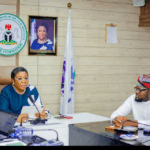By: Abiola Obafemi
Due to rising threats of food insecurity and economic instability in African countries, aquaculture, if handled appropriately, is emerging as one of the promising solutions to these issues.
With rising demand for seafood and growing pressure on wild fish stocks, fish farming is becoming an essential pillar of food production and livelihood support.
However, its prospects face challenges such as poor water quality, habitat degradation, and other environmental stressors.
Abiola Obafemi, an Environmental and Fisheries Scientist, is working to use scientific research to develop further understanding facing fisheries resources. Using innovative studies, Abiola investigates how environmental stressors affect both finfish and shell fisheries and proposes ways to improve the resilience of fisheries resources in Africa and beyond.
Having conducted research in the Gulf of Guinea, Lagos, and the Gulf of Mexico, North America, Abiola brings an extensive approach to addressing aquaculture and fisheries issues.
“Water quality plays a vital role in the success or failure of fish farming and fisheries operations,” Abiola says. Poor water quality poses a substantial risk to the health of aquatic species, which in turn threatens food security and jobs of the communities that rely on them.
Aquatic habitats, which cover more than two-thirds of the Earth’s surface, are the most biologically diverse ecosystems. Yet they are also among the most threatened due to pollution, overfishing, and extreme environmental stressors caused by the changing climate.
Abiola combines laboratory experiments and field monitoring to study how water quality factors like temperature, salinity, and dissolved oxygen impact aquaculture productivity. His work provides insight into how water quality impacts fisheries resources and contributes to their sustainability.
Read Also: Why EFCC arrested VeryDarkMan — Sowore
In Nigeria, aquaculture has the potential to boost national food production. His work is critical. His insights support efforts addressing Africa’s ecological challenges and food insecurity issues.
By collaborating with researchers, policymakers, and stakeholders, Abiola has proven to be an integral part of the scientists who seek to conserve natural resources in Africa and globally.
Abiola continues to advocate for innovative, environmentally sound aquaculture practices, ensuring that Africa’s aquatic ecosystems ensuring that Africa’s remain productive and resilient for generations to come.
•Obafemi, is a graduate of the University of Southern Mississippi, United States of America and a 2024 NOAA John A. Knauss Marine Policy Fellow.
WATCH TOP VIDEOS FROM NIGERIAN TRIBUNE TV
- Let’s Talk About SELF-AWARENESS
- Is Your Confidence Mistaken for Pride? Let’s talk about it
- Is Etiquette About Perfection…Or Just Not Being Rude?
- Top Psychologist Reveal 3 Signs You’re Struggling With Imposter Syndrome
- Do You Pick Up Work-Related Calls at Midnight or Never? Let’s Talk About Boundaries







